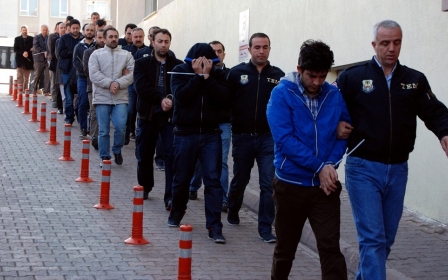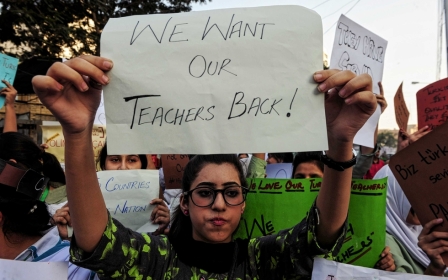Turkey arrests 57 in raids against Istanbul stock exchange

Turkey on Friday arrested 57 people in an operation against the Istanbul stock exchange as part of the investigation into the failed 15 July coup, state media said, as authorities detained the editor of an opposition newspaper.
The 57 were arrested in six different provinces, with over 100 arrest warrants issued, the state-run Anadolu news agency said. Efforts to detain the remaining suspects are in progress, it added.
They are suspected of links to the group of Fethullah Gulen, the US-based preacher Ankara accuses of being behind the failed plot to oust President Recep Tayyip Erdogan, it said. Gulen denies the charges.
The Haberturk daily said on its website that those held were former employees of the stock exchange suspected of using an encrypted messaging application called Bylock which Turkey claims was especially created for Gulen supporters.
They are also accused of performing transactions on behalf of Bank Asya, a bank once closely affiliated with Gulen.
Some 47,000 people have been arrested under the state of emergency imposed after the coup, while tens of thousands more have lost their jobs.
Late last month, Turkey dismissed almost 4,000 public officials under the state of emergency while over 9,100 police were suspended on 26 April.
The latest move underlines that there is to be no let-up in the anti-Gulen purge after Erdogan won a 16 April referendum on expanding his powers.
Turkey's Western allies, led by the European Union, have expressed concern over the magnitude of the post-coup purge which has affected every walk of life in Turkey.
Ankara, however, says that the action is necessary to rid Turkey of what Erdogan calls the "virus" created by Gulen's infiltration of key Turkish institutions.
Opposition journalist detained
Also on Friday, authorities detained the editor-in-chief of the online edition of opposition daily Cumhuriyet, the latest in a string of arrests targeting the paper.
Oguz Guven was detained by police in Istanbul and taken to the city's police headquarters for questioning, the Anadolu news agency said.
It added he had been detained due to a news story about the death in a traffic accident this week of senior Turkish prosecutor Mustafa Alper who had been a leading figure in the prosecutions of suspects detained over the failed July 15 coup.
It did not give further details. Guven had also said in a tweet that he was being detained.
One of Turkey's oldest newspapers, Cumhuriyet has been a leading critic of Turkish President Recep Tayyip Erdogan but seen 19 staff members charged under the state of emergency imposed after the failed coup.
Most are in jail and those held under arrest include some of the biggest names in Turkish journalism, including the paper's current editor in chief, Murat Sabuncu; commentator Kadri Gursel; writer Ahmet Sik; and cartoonist Musa Kart.
The journalists, most of whom have been held in prison for the last six months, face jail terms of up to 43 years if convicted.
They are accused of membership in a banned "terror group" and aiding outlawed organisations, charges which supporters have denounced as ridiculous.
Meanwhile Cumhuriyet's former editor in chief, Can Dundar, was last year handed a five-year-and-10-month jail term and has now fled Turkey for Germany over a front-page story accusing the government of sending weapons to Syria.
According to the P24 press freedom website, there are 165 journalists behind bars in Turkey, most of whom were detained as part of the state of emergency imposed after the failed coup.
Turkey ranks 155 on the latest world press freedom index of Reporters Without Borders (RSF), below Belarus and the Democratic Republic of Congo, and a drop of four places from its 2016 ranking.
Middle East Eye propose une couverture et une analyse indépendantes et incomparables du Moyen-Orient, de l’Afrique du Nord et d’autres régions du monde. Pour en savoir plus sur la reprise de ce contenu et les frais qui s’appliquent, veuillez remplir ce formulaire [en anglais]. Pour en savoir plus sur MEE, cliquez ici [en anglais].





